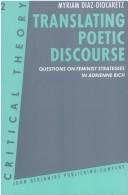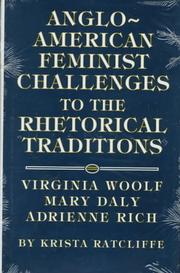| Listing 1 - 5 of 5 |
Sort by
|
Book
ISBN: 1282413554 9786612413551 1443810584 9781443810586 9781282413559 6612413557 Year: 2007 Publisher: Newcastle upon Tyne Cambridge Scholars Publishing
Abstract | Keywords | Export | Availability | Bookmark
 Loading...
Loading...Choose an application
- Reference Manager
- EndNote
- RefWorks (Direct export to RefWorks)
The eight essays in this collection explore the work of Adrienne Rich, one of America's most significant living writers and a poet and a public intellectual Other a substantial audience both inside and outside the academy. Taken together, the essays argue for a shift in the perceived center of gravity of Rich's career, from the passionate and eloquent poems of a largely personal feminist awakening, from the mid 60s to the early 80s, to the equally (if differently) passionate and eloquent poems...
Rich, Adrienne, --- Conrad, Adrienne, --- Criticism and interpretation.

ISBN: 1283328682 9786613328687 9027279748 9789027279743 0915027526 9780915027521 0915027534 9780915027538 902722403X 9027224048 9789027224033 Year: 1985 Publisher: Amsterdam Philadelphia Benjamins
Abstract | Keywords | Export | Availability | Bookmark
 Loading...
Loading...Choose an application
- Reference Manager
- EndNote
- RefWorks (Direct export to RefWorks)
Translating Poetic Discourse argues in favor of a critical model that bridges between translation and women's studies on theoretical and practical levels. It proposes key-elements to be integrated into the problem of interpretation of contemporary poetry by women, and discusses the links between gender markers and the speech situation in feminist discourse as a systematic problem. This book will be of interest to scholars of Translation Studies, Women's Studies, Poetry, Comparative Literature and Discourse.
Feminism and literature --- Feminist poetry, American --- Poetry --- Verse translating --- History --- History and criticism. --- Translating. --- Rich, Adrienne, --- Conrad, Adrienne, --- Criticism and interpretation.
Book
ISBN: 1498528732 1498528759 1498528740 9781498528740 9781498528733 Year: 2016 Publisher: Lanham
Abstract | Keywords | Export | Availability | Bookmark
 Loading...
Loading...Choose an application
- Reference Manager
- EndNote
- RefWorks (Direct export to RefWorks)
This collection of essays on the topics of feminist voice, vision, and performance in political poetries by Jayne Cortez and Adrienne Rich includes visual art and commentary by the feminist sculptor Linda Stein. The book examines the rise of the American popular-culture female superhero-notably, Wonder Woman-exploring the textuality of female-poetic activism through this superhero theme.
American poetry --- Feminism and literature --- Women and literature --- Women authors --- History and criticism. --- History --- Rich, Adrienne, --- Cortez, Jayne --- Criticism and interpretation. --- Richardson, Sallie Jayne --- Richardson, Jayne --- Conrad, Adrienne,

ISBN: 0809387816 0585031401 9780585031408 0809319349 9780809387816 Year: 1996 Publisher: Carbondale Southern Illinois University Press
Abstract | Keywords | Export | Availability | Bookmark
 Loading...
Loading...Choose an application
- Reference Manager
- EndNote
- RefWorks (Direct export to RefWorks)
"One of the few authors to define and focus on feminist theories of rhetoric, Krista Ratcliffe takes Bathsheba's dilemma as her controlling metaphor: "I have the feelings of a woman," says Bathsheba Everdene in Hardy's Far from the Madding Crowd, "but only the language of men." Although women and men have different relationships to language and to each other, traditional theories of rhetoric do not foreground such gender differences, Ratcliffe notes. She argues that feminist theories of rhetoric are needed if we are to recognize, validate, and address Bathsheba's dilemma. Ratcliffe argues that because feminists generally have not conceptualized their language theories from the perspective of rhetoric and composition studies, rhetoric and composition scholars must construct feminist theories of rhetoric by employing a variety of interwoven strategies: recovering lost or marginalized texts; rereading traditional rhetoric texts; extrapolating rhetorical theories from such nonrhetoric texts as letters, diaries, essays, cookbooks, and other sources; and constructing their own theories of rhetoric. Focusing on the third option, Ratcliffe explores ways in which the rhetorical theories of Virginia Woolf, Mary Daly, and Adrienne Rich may be extrapolated from their Anglo-American feminist texts through examination of the interrelationship between what these authors write and how they write. In other words, she extrapolates feminist theories of rhetoric from interwoven claims and textual strategies. By inviting Woolf, Daly, and Rich into the rhetorical traditions and by modeling the extrapolation strategy/methodology on their writings, Ratcliffe shows how feminist texts about women, language, and culture may be reread from the vantage point of rhetoric to construct feminist theories of rhetoric. She rereads Anglo-American feminist texts both to expose their white privilege and to rescue them from charges of naivete and essentialism. She also outlines the pedagogical implications of these three feminist theories of rhetoric, thus contributing to ongoing discussions of feminist pedagogies. Traditional rhetorical theories are gender-blind, ignoring the reality that women and men occupy different cultural spaces and that these spaces are further complicated by race and class, Ratcliffe explains. Arguing that issues such as who can talk, where one can talk, and how one can talk emerge in daily life but are often disregarded in rhetorical theories, Ratcliffe rereads Roland Barthes' "The Old Rhetoric" to show the limitations of classical rhetorical theories for women and feminists. Discovering spaces for feminist theories of rhetoric in the rhetorical traditions, Ratcliffe invites readers not only to question how women have been located as a part of-- and apart from--these traditions but also to explore the implications for rhetorical history, theory, and pedagogy. In extrapolating rhetorical theories from three feminist writers not generally considered rhetoricians, Ratcliffe creates a new model for examining women's work. She situates the rhetorical theories of Woolf, Daly, and Rich within current discussions about feminist pedagogy, particularly the interweavings of critical thinking, reading, and writing. Ratcliffe concludes with an application to teaching"-- "Ratcliffe explores the ways in which the rhetorical theories of Virginia Woolf, Mary Daly, and Adrienne Rich may be extrapolated from their Anglo-American feminist texts through examination of the interrelationship between what these authors write and how they write"--
Feminism. --- English language --- Persuasion (Rhetoric) --- English literature --- Women and literature --- Feminism and literature --- American literature --- Agrarians (Group of writers) --- Rhetoric --- Forensics (Public speaking) --- Oratory --- Germanic languages --- Emancipation of women --- Feminist movement --- Women --- Women's lib --- Women's liberation --- Women's liberation movement --- Women's movement --- Social movements --- Anti-feminism --- Rhetoric. --- History --- Women authors --- History and criticism. --- Emancipation --- Daly, Mary, --- Rich, Adrienne, --- Woolf, Virginia, --- Woolf, Virginia Stephen, --- Stephen, Virginia, --- Ulf, Virzhinii︠a︡, --- Ṿolf, Ṿirg'inyah, --- Vulf, Virdzhinii︠a︡, --- Вулф, Вирджиния, --- וולף, וירג׳יניה --- וולף, וירג׳יניה, --- Stephen, Adeline Virginia, --- Conrad, Adrienne, --- Criticism and interpretation. --- Woolf, Virginia
Multi
ISBN: 9155430716 9789155430719 Year: 1993 Volume: 82 Publisher: Uppsala : Almqvist & Wiksell : Acta universitatis upsaliensis,
Abstract | Keywords | Export | Availability | Bookmark
 Loading...
Loading...Choose an application
- Reference Manager
- EndNote
- RefWorks (Direct export to RefWorks)
Women and literature --- Authorship --- American poetry --- History --- Sex differences --- Women authors --- History and criticism --- Rich, Adrienne Cecile --- Griffin, Susan --- Dahlen, Beverly --- Knowledge --- Language and languages --- -Authorship --- -Women and literature --- -Literature --- Authoring (Authorship) --- Writing (Authorship) --- Literature --- American literature --- -History and criticism --- -Dahlen, Beverly --- -Griffin, Susan --- -Rich, Adrienne Cecile --- -גריפין, סוזן --- -Language and languages --- History and criticism. --- -Women authors --- -Knowledge --- -Authoring (Authorship) --- Women authors&delete& --- Rich, Adrienne, --- Conrad, Adrienne, --- גריפין, סוזן --- Language and languages. --- Rich, Adrienne --- Language --- Griffin, Susan, 1943 --- -Language --- Women --- Women and literature - United States - History - 20th century --- Authorship - Sex differences --- American poetry - Women authors - History and criticism --- Rich, Adrienne Cecile - Knowledge - Language and languages --- Griffin, Susan - Knowledge - Language and languages --- Dahlen, Beverly - Knowledge - Language and languages --- Rich (adrienne), 1929 --- -Griffin (susan) --- Dahlen (beverly) --- Critique et interpretation
| Listing 1 - 5 of 5 |
Sort by
|

 Search
Search Feedback
Feedback About UniCat
About UniCat  Help
Help News
News